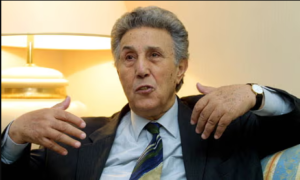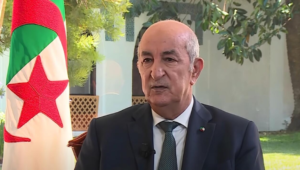Since its independence in 1962, Algeria has had several presidents who have led the country through various phases of political and economic challenges. Below is a table listing all the presidents of Algeria in chronological order, along with their years of tenure.
| President | Years of Tenure |
|---|---|
| Ahmed Ben Bella | 1963 – 1965 |
| Houari Boumédiène | 1965 – 1978 |
| Rabah Bitat (Acting) | 1978 – 1979 |
| Chadli Bendjedid | 1979 – 1992 |
| Mohamed Boudiaf | 1992 (Assassinated) |
| Ali Kafi (Acting) | 1992 – 1994 |
| Liamine Zéroual | 1994 – 1999 |
| Abdelaziz Bouteflika | 1999 – 2019 |
| Abdelkader Bensalah (Acting) | 2019 |
| Abdelmadjid Tebboune | 2019 – Present |
READ ALSO: Presidents That Have Ruled Egypt Till Date
First President of Algeria: Ahmed Ben Bella
Tenure: 1963 – 1965

Ahmed Ben Bella was a revolutionary leader who played a crucial role in Algeria’s fight for independence from French colonial rule. He became the first President of Algeria in 1963.
Notable Achievements:
- Independence Leadership: Ben Bella was instrumental in leading the National Liberation Front (FLN) during the Algerian War of Independence, which culminated in Algeria gaining independence in 1962.
- Agrarian Reform: He initiated agrarian reform policies aimed at redistributing land from French settlers to Algerian peasants.
Downsides:
- Autocratic Rule: Ben Bella’s tenure was marked by his increasingly autocratic style of governance. He sidelined many of his colleagues from the independence struggle and concentrated power in his own hands.
- Economic Challenges: Despite his reforms, the country faced significant economic difficulties, and his policies were criticized for being poorly implemented and overly ambitious.
Ben Bella was overthrown in a military coup led by Houari Boumédiène in 1965, ending his presidency abruptly.
READ ALSO: Prime Ministers That Have Ruled Morocco Till Date
Current President of Algeria:

Tenure: 2019 – Present
Abdelmadjid Tebboune took office as President of Algeria in December 2019 after winning the presidential election. His presidency has been characterized by attempts to address both political and economic issues in the country.
Notable Achievements:
- Constitutional Reforms: Tebboune has pushed for constitutional reforms aimed at reducing the powers of the presidency and increasing democratic governance.
- Anti-Corruption Efforts: He has launched significant anti-corruption campaigns, targeting former officials and businessmen associated with previous administrations.
Downsides:
- Protests and Political Instability: Tebboune’s presidency began amid ongoing protests by the Hirak movement, which calls for comprehensive political reform and greater transparency.
- Economic Struggles: Algeria continues to face economic challenges, including high unemployment and a heavy reliance on oil and gas exports, which have been impacted by fluctuating global prices.
READ ALSO: Presidents That Have Ruled Ghana Till Date
Current Vice President of Algeria
As of now, Algeria does not have a designated position of Vice President in its governmental structure. The Algerian political system primarily consists of the President, Prime Minister, and other ministerial roles.
The absence of a Vice President is part of the unique political setup of Algeria, where the Prime Minister often takes on roles similar to that of a Vice President in other countries.
Table of Presidents
[table “26” not found /]READ ALSO: Presidents That Have Ruled Guyana Till Date
Highlights of Notable Presidents
Houari Boumédiène (1965 – 1978):
- Economic Development: Boumédiène focused on industrialization and agrarian reform, initiating large-scale state projects.
- Non-Aligned Movement: He played a prominent role in the Non-Aligned Movement, advocating for decolonization and economic independence for developing nations.
- Downside: His rule was characterized by authoritarianism, with limited political freedoms and suppression of opposition.
Chadli Bendjedid (1979 – 1992):
- Economic Liberalization: Bendjedid attempted to liberalize the economy by reducing state control and encouraging private enterprise.
- Political Reform: Introduced multiparty politics in the late 1980s, leading to the first multi-party elections in Algeria.
- Downside: His tenure ended amid political instability and the rise of Islamist movements, leading to a civil war in the 1990s.
Abdelaziz Bouteflika (1999 – 2019):
- Ending Civil War: Bouteflika is credited with ending the Algerian Civil War through a policy of national reconciliation.
- Economic Initiatives: Launched infrastructure projects and attempted to diversify the economy.
- Downside: His later years were marred by allegations of corruption, economic mismanagement, and health issues, leading to widespread protests and his eventual resignation in 2019.
READ ALSO: Presidents That Have Ruled Paraguay Till Date
Conclusion
Algeria’s history has been shaped by its leaders, each bringing their vision and challenges. From the revolutionary beginnings under Ahmed Ben Bella to the current leadership of Abdelmadjid Tebboune, the country’s presidents have navigated complex political and economic landscapes. Understanding these leaders’ impacts provides insight into Algeria’s ongoing journey towards stability and growth.
